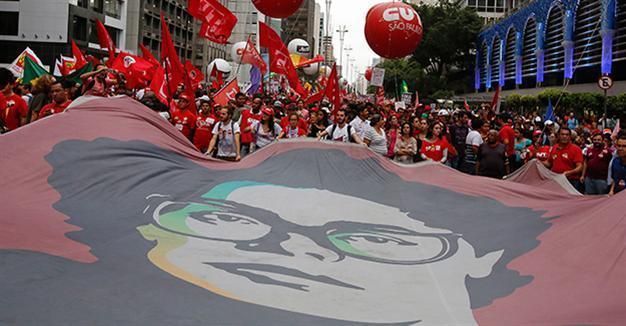Brazil stripped of investment grade rating as crisis deepens
BRASILIA - Reuters

Demonstrators march holding a banner with a drawing depicting Brazil's President Dilma Rousseff when she was a young revolitionary, during a protest against the impeachment proceedings against her, in Sao Paulo, Brazil, Wednesday, Dec. 16, 2015. AP Photo
Brazil lost its coveted investment-grade rating on Dec. 16 after Fitch became the second credit agency to downgrade the country’s debt to junk status, citing concerns about an economic and political crisis threatening to topple President Dilma Rousseff.
Fitch downgraded Brazil to BB+ with a negative outlook less than 24 hours after the left-leaning Rousseff moved to loosen next year’s budget targets in a bid to safeguard spending for welfare programs. The decision undercut her orthodox finance minister, Joaquim Levy who staked his reputation on an austerity agenda that has now stalled in Congress.
Levy blamed the government’s abandonment of targets needed to cut debt for Fitch’s decision.
“Obviously the goal of zero (debt reduction) is very bad and resulted in the downgrade,” he told Band News TV on late Dec. 16.
The real currency and dollar-denominated bonds tumbled amid forced selling after the downgrade, which came just three months after Standard & Poor’s cut Brazil’s rating to junk, further clouding the outlook for an economy reeling from its sharpest downturn in a quarter-century.
Investors barred from owning junk bonds could dispose of about $20 billion in Brazilian sovereign and corporate debt after two agencies downgraded Brazil, analysts at JPMorgan Securities estimated in October.
It marked a bitter reversal for Latin America’s largest economy, seven years after a commodities-fueled boom helped propel it to investment-grade status, feeding expectation that its economy would escape sharp cycles of boom and bust that has kept millions in poverty.
Fitch said a deepening political crisis had restricted the government’s ability to right the economy. Rousseff’s opponents have accused her of breaking budget rules and are trying to impeach her, while key allies are threatening to bolt her coalition amid a widening bribery scandal at state-run oil company Petrobras.
With Fitch leaving Brazil’s credit outlook on negative, and Moody’s Investor Services also reviewing its rating, further downgrades to the country’s creditworthiness could follow.
Standard & Poor’s cut Brazil’s rating to junk in September, and Moody’s Investors Service put the country on review last week for a possible downgrade to that level.
Fitch’s downgrade of the sovereign credit rating worsens the outlook for large corporate borrowers already contending with the rising borrowing costs, said Alberto Gallo, head of global macro credit strategy at Royal Bank of Scotland in London.
This year, global bond offerings by Brazilian companies have plummeted 82 percent to about $5.7 billion, according to Credit Suisse Group AG data. Brazil has accounted for less than 9 percent of Latin American global debt offerings this year, down from 32 percent in 2014.
